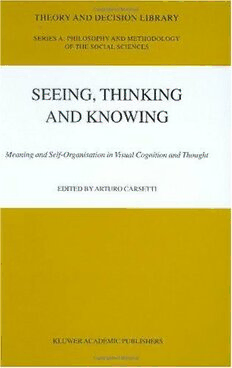
Seeing, Thinking and Knowing: Meaning and Self-Organisation in Visual Cognition and Thought PDF
361 Pages·2004·5.662 MB·English
Most books are stored in the elastic cloud where traffic is expensive. For this reason, we have a limit on daily download.
Preview Seeing, Thinking and Knowing: Meaning and Self-Organisation in Visual Cognition and Thought
Description:
The world perceived at the visual level is constituted not by objects or static forms, but by processes appearing imbued with meaning. As G. Kanizsa stated, at the visual level the line per se does not exist: only the line which enters, goes behind, divides, etc., a line evolving according to a precise holistic context, in comparison with which function and meaning are indissolubly interlinked. Just as the meaning of words is connected with a universe of highly-dynamic functions and functional processes which operate syntheses, cancellations, integrations, etc. (a universe which can only be described in terms of symbolic dynamics), in the same way, at the level of vision, we must continuously unravel and construct schemata; we must assimilate and make ourselves available for selection by the co-ordinated information penetrating from external Reality. Lastly, we must interrelate all this with the internal selection mechanisms through a precise "journey" into the regions of intensionality. In accordance with these intuitions, we may directly consider, from the more general point of view of contemporary Self-organisation theory, the network of meaningful programs living at the level of neural systems as a complex one which articulates and develops, functionally, within a "coupled universe" characterised by the existence of a double selection: external and internal, the latter regarding the universe of meaning. This network gradually posits itself as the basis for the emergence of natural and meaningful forms and the simultaneous, if indirect, surfacing of an "I-subject-": as the basic instrument, in other words, for the perception of real and meaningful processes, of "objects" possessing meaning, aims, intentions, etc.: above all, of biological objects possessing an inner plan and linked to the progressive expression of a specific cognitive action.
See more
The list of books you might like
Most books are stored in the elastic cloud where traffic is expensive. For this reason, we have a limit on daily download.
